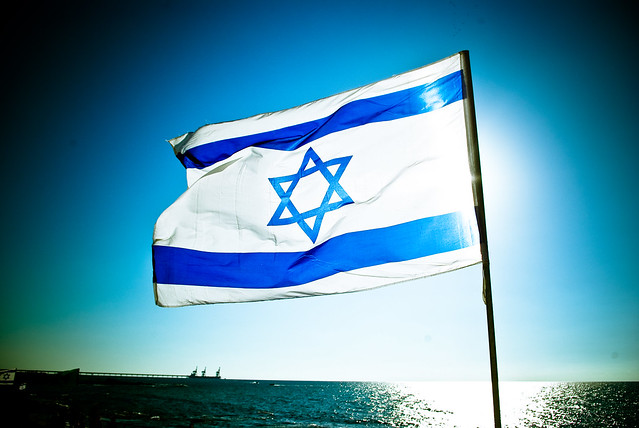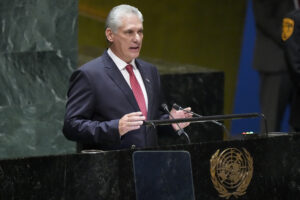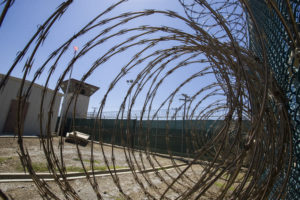The Latest Sign of Israel’s Creeping Fascism
Omar Shakir, Israel and Palestine director at Human Rights Watch, examines Jerusalem's decision to expel the organization from the country. Le Monde est à nous / Flickr
Le Monde est à nous / Flickr
What follows is a conversation between Omar Shakir, Israel and Palestine director at Human Rights Watch, and Sharmini Peries of the Real News Network. Read a transcript of their conversation below or watch the video at the bottom of the post.
SHARMINI PERIES It’s The Real News Network. I’m Sharmini Peries coming to you from Baltimore. Israel claims to be a democratic country, but it appears freedom of speech is not included in that democracy. The government of Israel is expelling the Israel and Palestine Director of Human Rights Watch, Omar Shakir. He has been issued a deportation order to leave the country within two weeks because the Israeli government doesn’t like the reports its been issuing. Joining us then to discuss his situation is Omar Shakir. He is currently based in Israel for the moment and has decided to make one last appeal to the Israeli High Court about his deportation order. It is important for us to actually understand the credibility of the person that they are deporting. Omar Shakir is the Israel and Palestine Director at the Human Rights Watch. He investigates human rights abuses in Israel and the West Bank and Gaza. He has been responsible for many of the factfinding missions about human rights atrocities and getting the word out through Human Right Watch’s reports. He was formerly also Bertha Fellow at the Center for Constitutional Rights, which is based in New York, where he focused on counterterrorism policies, including legal repression of detainees at Guantanamo. He worked on that as well as in 2013-2014 he was [Alan] R. and Barbara D. Finberg Fellow at Human Rights Watch. He investigated human rights violations in Egypt, including the Rabaa massacre. He’s also a former Fulbright scholar in Syria. Omar holds a J.D. from Stanford Law School, where he co-authored a report on the civilian consequences of U.S. drone strikes in Pakistan as a part of his international human rights and conflict-resolution clinic. He also holds an M.A. in Arab Studies from Georgetown University’s School of Foreign Affairs and a B.A. in International Relations from Stanford. With all that, welcome, Omar, to The Real News Network.
OMAR SHAKIR Thank you for having me.
SHARMINI PERIES Omar, you are making a last attempt here to appeal to Israel’s High Court to prevent Israel from deporting you. What are the chances of that succeeding and why are you doing that?
OMAR SHAKIR We are hopeful it will succeed. We think the decision that was made by Israel’s district court in Jerusalem is new and dangerous in important ways. While of course, Israeli courts have often provided justification for abuses by the government, this is really the first time a court has put its seal on the government’s relentless effort to target advocacy around Palestinian human rights. The reality here is that what the court is essentially saying is, if you call for boycotts of a company because they for example, mistreat workers or discriminate against women, that’s permissible. But if you’re calling for boycotts because they violate the rights of Palestinians, that’s suddenly impermissible. And you can imagine the kind of slippery slope we’re heading down now. Is the next thing that the organizations that criticize or call the West Bank “occupied,” or call it “apartheid,” or whatever it may be— are suddenly those gonna be grounds for denying entry to international advocates? And eventually, increasing pressure on Israeli and Palestinian advocates? So we’re hopeful that the Supreme Court will realize the significant stakes here. It’s bigger than Human Rights Watch. It’s bigger than human rights defenders. It really goes to the ability in Israel today to engage in a certain kind of advocacy and we hope the Supreme Court will reject this decision and we’ll be watching with bated breath.
SHARMINI PERIES Alright. By appealing to the Israeli High Court, aren’t you doing the government a favor in the sense that the Israeli government is in the process of dismantling this court and delegitimizing it. It’s been accusing it of being lefty, too supportive of human rights. And if your appeal actually succeeds, you then reinforce the illusion that Israel has some sort of freedom of speech, and this kind of critique of the government could be done and upheld by the courts.
OMAR SHAKIR Look, whatever system you’re in, you’ve got to use every tool at your disposal to advance protections for those documenting rights abuse. As I said, this is bigger than just Human Rights Watch. Our access here means our ability to engage victims, partner with Israeli and Palestinian brave rights defenders who are on the ground every day struggling to do this work, and it’s really important to those communities. And that’s why we’ve seen statements of support from a range of Israeli Palestinian rights defenders first and foremost, because they understand not only that this decision could affect them, but that their ability to do work is in part linked to their ability to engage with, have dialogues, partner with international rights organizations. So I think you have to use every outlet available to you because ultimately, I think the ramifications of not doing so are not only further shrinking the space for rights defenders, but ultimately less oversight, less transparency over rights abuse, which inevitably means more rights abuses. If the world can’t stop Israel from somebody documenting rights abuse, how will they ever stop rights abuse in the first place? So you’ve got to use every tool at your disposal. I don’t think we have the luxury of saying, let’s not challenge, let’s try to support one side of an argument. Ultimately, our mission is to concretely protect rights.
SHARMINI PERIES Alright. Omar, true and good thing you’re doing that. What is the reason that the government sites on your deportation order? Why are they asking you to leave?
OMAR SHAKIR So the government’s rationale— it’s been a multi-year effort to muzzle Human Rights Watch. The argument several years ago was about Human Rights Watch being propagandists for the Palestinians, but the current deportation order is based on an accusation that I promote calls for boycotting Israel. When the original deportation order was given a year ago, they focused on my activism years ago as a student at Stanford. But in court, in part because our legal challenge to that decision, we first of all challenged the fact that Israel who proclaims to be a democracy, is deporting a rights defender over their peaceful expression. And we challenged the law that denies entry to people based on calling for boycotts. But the reality here is, much of their argument is focused on my work at Human Rights Watch because the law requires support for boycotts to be active and continuous. And for nearly three years, I’ve been Human Rights Watch’s spokesperson on these issues and neither has Human Rights Watch fully stood by me and not renounced any statement that I’ve made. I’ve been advocating their positions. And in court, the government has basically been saying that Human Rights Watch’s work, even though we don’t take a position on boycotts, by documenting abuses of companies and telling them to stop fueling rights abuse, that itself is boycotts. So the court’s decision that came down a couple of weeks ago, more or less stated that I had been continuously calling for boycotts, including both my work as a student and my current work at Human Rights Watch. But the decision directly states that Human Rights Watch’s advocacy is boycott-promoting activity.
SHARMINI PERIES Hmm. Very interesting. If you appeal to the Israeli High Courts fail, what will the Human Rights Watch do in terms of the reports it’s been issuing on Israel and Palestine?
OMAR SHAKIR Look, unfortunately, in the current day and age, there have been some other countries that have denied us access while Israel has been a place for nearly three decades, we’ve been able to access the West Bank and Israel— of course, not Gaza on a regular basis, especially in the last decade. If Israel takes this course, they’ll be joining a rank of countries like Cuba, North Korea, Venezuela, that have barred or expelled Human Rights Watch researchers, but that won’t change our work. We’ll be doing the exact same work, using the exact same tools, covering the exact same subjects, whether I’m in the country or not. Because this work is part of our mission and our mission continues. We don’t let governments opt out of Human Rights Watch oversight by virtue of kicking us out. We will continue to do the exact same work. Of course, it presents difficulties and challenges, but we will certainly not by one millimeter reduce our passion and zest for covering issues in Israel-Palestine, as we do every other country in the Middle East and North Africa, and nearly 100 countries across the world.
SHARMINI PERIES Alright. Omar, I thank you so much for joining us and all the best with your appeal.
OMAR SHAKIR Thank you very much for having me.
SHARMINI PERIES And thank you for joining us here on The Real News Network.
Your support matters…
Independent journalism is under threat and overshadowed by heavily funded mainstream media.
You can help level the playing field. Become a member.
Your tax-deductible contribution keeps us digging beneath the headlines to give you thought-provoking, investigative reporting and analysis that unearths what's really happening- without compromise.
Give today to support our courageous, independent journalists.






You need to be a supporter to comment.
There are currently no responses to this article.
Be the first to respond.